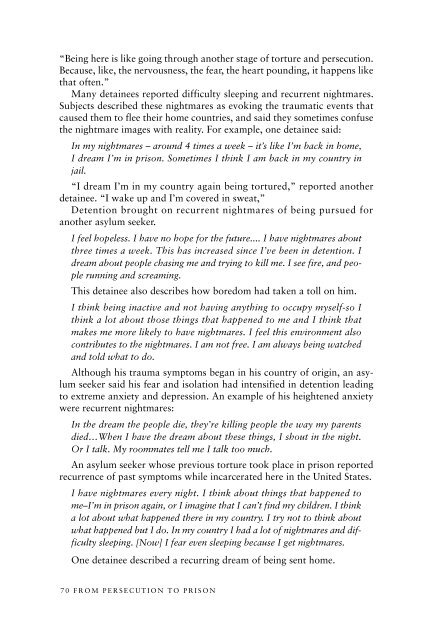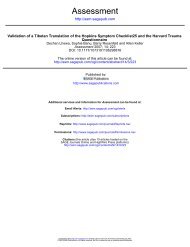From Persecution to Prison - Bellevue/NYU Program for Survivors of ...
From Persecution to Prison - Bellevue/NYU Program for Survivors of ...
From Persecution to Prison - Bellevue/NYU Program for Survivors of ...
You also want an ePaper? Increase the reach of your titles
YUMPU automatically turns print PDFs into web optimized ePapers that Google loves.
“Being here is like going through another stage <strong>of</strong> <strong>to</strong>rture and persecution.Because, like, the nervousness, the fear, the heart pounding, it happens likethat <strong>of</strong>ten.”Many detainees reported difficulty sleeping and recurrent nightmares.Subjects described these nightmares as evoking the traumatic events thatcaused them <strong>to</strong> flee their home countries, and said they sometimes confusethe nightmare images with reality. For example, one detainee said:In my nightmares – around 4 times a week – it’s like I’m back in home,I dream I’m in prison. Sometimes I think I am back in my country injail.“I dream I’m in my country again being <strong>to</strong>rtured,” reported anotherdetainee. “I wake up and I’m covered in sweat,”Detention brought on recurrent nightmares <strong>of</strong> being pursued <strong>for</strong>another asylum seeker.I feel hopeless. I have no hope <strong>for</strong> the future.... I have nightmares aboutthree times a week. This has increased since I’ve been in detention. Idream about people chasing me and trying <strong>to</strong> kill me. I see fire, and peoplerunning and screaming.This detainee also describes how boredom had taken a <strong>to</strong>ll on him.I think being inactive and not having anything <strong>to</strong> occupy myself-so Ithink a lot about those things that happened <strong>to</strong> me and I think thatmakes me more likely <strong>to</strong> have nightmares. I feel this environment alsocontributes <strong>to</strong> the nightmares. I am not free. I am always being watchedand <strong>to</strong>ld what <strong>to</strong> do.Although his trauma symp<strong>to</strong>ms began in his country <strong>of</strong> origin, an asylumseeker said his fear and isolation had intensified in detention leading<strong>to</strong> extreme anxiety and depression. An example <strong>of</strong> his heightened anxietywere recurrent nightmares:In the dream the people die, they’re killing people the way my parentsdied…When I have the dream about these things, I shout in the night.Or I talk. My roommates tell me I talk <strong>to</strong>o much.An asylum seeker whose previous <strong>to</strong>rture <strong>to</strong>ok place in prison reportedrecurrence <strong>of</strong> past symp<strong>to</strong>ms while incarcerated here in the United States.I have nightmares every night. I think about things that happened <strong>to</strong>me–I’m in prison again, or I imagine that I can’t find my children. I thinka lot about what happened there in my country. I try not <strong>to</strong> think aboutwhat happened but I do. In my country I had a lot <strong>of</strong> nightmares and difficultysleeping. [Now] I fear even sleeping because I get nightmares.One detainee described a recurring dream <strong>of</strong> being sent home.70 FROM PERSECUTION TO PRISON



